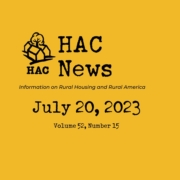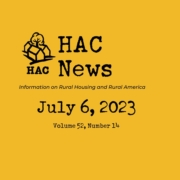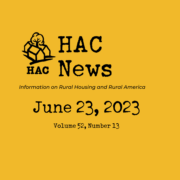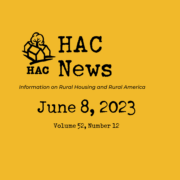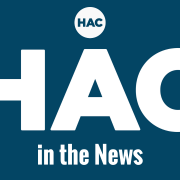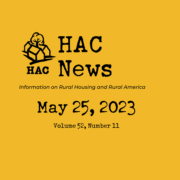HAC News: July 20, 2023
Vol. 52, No. 15
TOP STORIES
House committee approves HUD funding measure
On July 18 the House Appropriations Committee passed an FY24 spending bill for the Departments of Transportation and HUD that would maintain funding for tenant vouchers, public housing, and Native American housing programs but would cut programs including HOME, Section 202 elderly housing, Section 811 housing for people with disabilities, and SHOP. HOME would be the most drastically impacted, with its funding cut from $1.5 billion in FY23 to $500 million in FY24. The bill also proposes to block HUD’s Affirmatively Furthering Fair Housing regulations. More details are available on HAC’s website. The Senate Appropriations Committee is scheduled to mark up its FY24 Transportation-HUD appropriations bill on July 20, but has not yet made the bill’s contents public. HAC’s site will be updated when more information becomes available.
Torres Small confirmed as USDA Deputy Secretary
Xochitl Torres Small was confirmed by the Senate on July 11 and sworn in on July 17 as Deputy Secretary at USDA, after serving as Under Secretary for Rural Development since October 2021. Roger Glendenning is now Acting Under Secretary.
National Rural Housing Conference registration opens!
Register by August 11 for early bird rates at the 2023 National Rural Housing Conference! Stakeholders in the field of rural affordable housing, community development, and placemaking will come together October 24-27 in Washington, DC. The 2023 conference theme is Build Rural. Thriving rural communities don’t happen by accident. It takes collaborative effort, leadership, investment and planning to build equitable and just communities. Build Rural is both a literal and figurative appeal to explore and provoke action to build and renew rural communities by addressing housing affordability and preservation, community infrastructure and essential facilities creation and revitalization, resident led placemaking, capacity building, and community inclusion and justice efforts.
RuralSTAT
In the parts of North and South Carolina outside metro areas, home prices and median household income both grew between 2016 and 2021, but home prices increased by 13 percentage points more than incomes. Source: Federal Reserve Bank of Richmond.
OPPORTUNITIES
EPA offers Greenhouse Gas Reduction Fund grants
All three funding notices under the new $27 billion Greenhouse Gas Reduction Fund have now been released. Details and resources are posted on EPA’s website. For more information, email ggrf@epa.gov.
- The $14 billion National Clean Investment Fund will make grants to two or three national nonprofit lenders or coalitions, which will partner with the private sector to finance clean technology projects in homes, businesses, and communities. An informational webinar is scheduled for July 26. Applications are due October 12.
- The $6 billion Clean Communities Investment Accelerator will make grants to between two and seven hub nonprofit organizations, enabling them to provide funding and technical assistance to public, quasi-public, and nonprofit community lenders. An informational webinar is scheduled for July 27. Applications are due October 12.
- The $7 billion Solar for All program, announced in June, will award up to 60 grants to states, territories, Tribal governments, municipalities, and nonprofits to expand the number of low-income and disadvantaged communities primed for residential solar investment. Notices of intent to apply are due July 31 for states, DC, and Puerto Rico; August 14 for territories, municipalities, and nonprofits; and August 28 for Tribal governments and intertribal consortia. Applications are due September 26.
Community Facilities disaster grants available
USDA has $50 million for Community Facilities grants to repair essential community facilities damaged by presidentially declared disasters in calendar year 2022. Applications will be accepted until funds are expended. Contact a USDA RD state office to discuss a potential project. For more information, contact Surabhi Dabir, USDA, 202-768-5875.
PHAs eligible for radon funding
Under the Radon Testing and Mitigation Demonstration for Public Housing, HUD will fund public housing agencies to conduct testing and, if applicable, mitigation of radon in the units they manage and to support the development of a plan for future testing and mitigation as needed. The deadline is August 21. For more information, contact Rhona P. Julien, HUD, 202-402-6842.
REGULATIONS AND FEDERAL AGENCIES
Some Section 504 repair program rules waived for disaster areas
A pilot program in 24 states and territories, effective from July 18, 2023 through July 18, 2025, waives four regulatory requirements for Section 504 loans and grants in presidentially declared disaster areas. The waivers (1) remove the requirement for grant recipients to be at least 62 years old, (2) allow the program to cover costs incurred before an application, (3) allow the program to cover the cost of moving or delivering a manufactured home, and (4) allow assistance to applicants who are not currently living at the property. For more information, contact Anthony Williams, USDA, anthonyl.williams@usda.gov, 202-720-9649.
USDA taking applications for Discrimination Financial Assistance Program
On July 7, USDA opened the application process for farmers, ranchers, and forest landowners who experienced discrimination in USDA farm lending programs prior to January 2021. The program’s website offers applications in English and Spanish, information on how to get help to apply, and other resources and details about the program. Applications can be filed online, by mail, or in person at the program’s local offices. USDA will consider all applications submitted by October 31; this is not a first come, first served process. Eight organizations including the Federation of Southern Cooperatives, Intertribal Agriculture Council, and Rural Coalition will assist applicants. For more information, call 1-800-721-0970 or email info@22007apply.gov.
Energy efficiency comment deadline extended
The deadline is now August 7 to submit comments on HUD’s and USDA’s adoption of updated energy efficiency standards for some of the housing they finance.
Online platforms agree to improve information about junk fees for renters
The White House and HUD announced on July 19 that three of the largest online rental platforms – AffordableHousing.com, Zillow, and Apartments.com – will provide new tools to help inform renters about fees that increase the actual cost of a rental unit, such as application fees, move-in fees, and “convenience fees” for paying rent online. HUD also released a brief on Transparency in Rental Fees summarizing research on these fees and strategies to encourage transparency and fairness in the rental market. Several states have taken actions to limit or require disclosure of these fees. An article about efforts to create websites to help find affordable housing is available here.
2023 income limits for single-family rural housing published
USDA RD has released FY23 income limits for the Section 502 direct loan program and Section 504 direct loan and grant programs. Relevant websites, systems, and worksheets have been updated.
Corrections made for Section 538 lender submission process
A notice corrects errors in some provisions of USDA’s April update to the lender submission process for Section 538 guarantees. For more information, contact Jonathan Bell, USDA, MFHprocessing1@usda.gov, 254-742-9764.
EVENTS
Webinar on rural disaster preparedness set for August 1
Rural Disaster Preparedness: Partnering for Resilience and Resources, a new Rural Opportunity and Development (ROAD) Session on August 1, is hosted by Aspen Institute’s Community Strategies Group in collaboration with HAC, the Rural Community Assistance Partnership, Rural LISC, the International Economic Development Council, and the Federal Reserve Board. The webinar will be offered both virtually and in-person in Washington, DC.
PUBLICATIONS AND MEDIA
Online disaster guide supports survivors of floods in Vermont
To assist our rural partners and communities affected by the recent flash flooding in Vermont, HAC offers an online resource guide with information for individuals and families in the disaster area. Other disaster resources from HAC include Rural Resilience in the Face of Disaster and a Disaster Response for Rural Communities Guide.
Mortgages under $150,000 should be more available, researchers say
Small Mortgages Are Too Hard to Get, an issue brief by the Pew Charitable Trusts, reports that from 2018 to 2021, only 26% of properties that sold for less than $150,000 were financed using a mortgage, compared with 71% of higher-cost homes. Inability to obtain small mortgages may make homeownership impossible or lead buyers to use alternative financing arrangements, which tend to be riskier and costlier than mortgages. The brief examines reasons for the shortage of small mortgages and suggests solutions.
Research presents persistent poverty by census tracts rather than counties
Efforts to address persistent poverty – poverty rates above 20% for at least 30 years – have focused on county-level designations, and 81% of persistent poverty counties are outside metro areas. Advancing Economic Development in Persistent-Poverty Communities, an Economic Innovation Group analysis, suggests analyzing long-term poverty at the census tract level in order to capture more urban places. This would bring the total persistent poverty area population to 35 million, compared to about 20 million using the county definition. The report proposes typologies that would show key differences and similarities, as well as a development assessment that would identify strengths and weaknesses in local economies and could inform development strategies.
HAC
Leonel Parra becomes HAC’s Chief Financial Officer
HAC is excited to welcome Leonel Parra as our new CFO. With extensive expertise in the nonprofit, financial and professional services, technology, and manufacturing sectors, Leonel brings a wealth of knowledge that will help HAC sustain our unprecedented growth and deepen our impact. More details about Leonel’s background are available on HAC’s website.
HAC provides input on Duty to Serve
On July 17-19 the FHFA hosted its annual series of listening sessions on Fannie Mae’s and Freddie Mac’s Duty to Serve, focusing on the three components of the Duty to Serve Plans: rural housing, manufactured housing, and affordable housing preservation. Jonathan Harwitz, HAC’s Director of Public Policy, provided oral comments, accompanied by longer written comments, on behalf of HAC. HAC’s comments, which will be posted here, focused on maintaining USDA Section 515 preservation as a core goal of the rural Duty to Serve Plans; permitting targeted equity investments in CDFIs; using, and further refining, the new Colonias Census Tract definition; and meeting rural LIHTC equity investment goals. FHFA is still accepting written comments (at the link, select Duty to Serve Listening Sessions).
Need capital for your affordable housing project?
HAC’s loan fund provides low interest rate loans to support single- and multifamily affordable housing projects for low-income rural residents throughout the U.S. and territories. Capital is available for all types of affordable and mixed-income housing projects, including preservation, new development, farmworker, senior and veteran housing. HAC loan funds can be used for pre-development, site acquisition, site development, construction/rehabilitation and permanent financing. Contact HAC’s loan fund staff at hacloanfund@ruralhome.org, 202-842-8600.
Please note: HAC is not able to offer loans to individuals or families. Borrowers must be nonprofit or for-profit organizations or government entities (including tribes).
Want to reprint a HAC News item?
Please credit the HAC News and provide a link to HAC’s website. Thank you!

